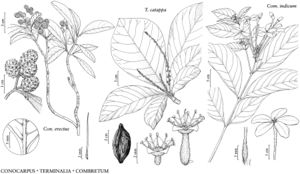Difference between revisions of "Terminalia catappa"
Syst. Nat. ed. 12, 2: 674. 1767.
imported>Volume Importer |
imported>Volume Importer |
||
| Line 49: | Line 49: | ||
|publication year=1767 | |publication year=1767 | ||
|special status= | |special status= | ||
| − | |source xml=https://xjsachs2@bitbucket.org/aafc-mbb/fna-data-curation.git/src/ | + | |source xml=https://xjsachs2@bitbucket.org/aafc-mbb/fna-data-curation.git/src/e39f0e846f172941159b2045254d62d10d9823f6/coarse_grained_fna_xml/V10/V10_678.xml |
|genus=Terminalia | |genus=Terminalia | ||
|species=Terminalia catappa | |species=Terminalia catappa | ||
Latest revision as of 11:33, 9 May 2022
Trees or shrubs to 20(–35) m; branches without thorns. Leaves persistent or tardily deciduous (then turning red and plants briefly leafless); petioles 5–28 mm; blade obovate, 6–35 × 2.6–16.5 cm, base narrowly cuneate to rounded or narrowly and obscurely cordate, apex acuminate or short-acuminate to obtuse or rounded, surfaces glabrate to moderately pubescent abaxially, midvein and secondary veins sparsely to densely pubescent, with nectar glands near base, glabrous or glabrate adaxially, midvein densely to sparsely pubescent, at least basally; with pit-domatia at junction of secondary and tertiary veins with midvein, or junction of tertiary with secondary veins, or other vein junctions. Spikes 5–25 cm, with bisexual flowers proximally, staminate flowers distally. Flowers 5-merous, bisexual and staminate; free portion of hypanthium 1–2 mm; sepals 1–2.8 mm; stamens 3–4.5 mm; style 3.5–4 mm. Drupes green or red, slightly flattened, ovoid to ellipsoid, 35–70 × 20–50 mm, sparsely pubescent or glabrous; with 2 well-developed ridges or wings; hypanthium and calyx deciduous in age.
Phenology: Flowering spring–summer.
Habitat: Disturbed habitats, especially near coast.
Elevation: 0–10 m.
Distribution
Introduced; Fla., Asia, Pacific Islands, n Australia, introduced also widely in Neotropics.
Discussion
Terminalia catappa is commonly used as an ornamental tree in southern Florida, and has naturalized in Brevard, Broward, and Miami-Dade counties.
Selected References
None.
